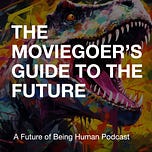Chapter 7 of Films from the Future: The Technology and Morality of Sci-Fi movies, read by author Andrew Maynard
In this episode: Ghost in the Shell
Through a Glass Darkly | Body Hacking | More that “Human”? | Plugged In, Hacked Out | Your Corporate Body
Ghost in the Shell is quite a complex movie, and when I was writing Films from the Future I must confess that I struggled with it. But it provides such a good jumping off point for exploring the world of using technology to augment the human body that I persevered — and I’m glad I did.
I now have a deep respect for Ghost in the Shell — aided I’m sure by watching it in class at least once a year with my students! It’s a beautiful, complex, and surprising philosophical film, that wraps deep reflections of the meaning of personhood in a Japanese Anime action movie.
What stood out to to me more than anything though when I was writing this chapter of Films from the Future was the insights that it provides into what it means to be human in a technologically complex world.
I wrote the chapter in late 2017/early 2018 — four years before I would launch the Arizona State University Future of Being Human initiative. Revisiting the chapter for this recording, I can see very clearly the seeds of how my own thinking had developed around personhood and the nature of being human when technology is increasingly a part of who we are.
What I wasn’t expecting as I pulled this episode together is how relevant the chapter still is to discussions around AI and AGI. While we’re still a long way from machines that have consciousness and self-awareness, I would argue strongly that we need to start thinking deeply about how they might be treated, and how this in turn reflects and defines our own humanity — and especially, how we avoid dehumanizing them by claiming that they are not and never will be “human” to justify how we control and use them.
This is where Ghost in the Shell provides a powerful backdrop for moving from very conventional ideas of humanity to more sophisticated concepts of personhood.
Note: On a re-listen I realize that I verbally slipped and stated Neuralink was launched in 2007 — of course the public launch was in 2017, not ten years earlier!
About Films from the Future: I started writing Films from the Future in 2017. The intent was to explore the deeply complex landscape around emerging technologies, the future, and socially responsible innovation, in a way that would be accessible to most readers, and at the same time provide nuanced and important insights that weren’t available anywhere else.
One of the challenges with most books about tech and the future is that they take a polarized stance — we’re either all going to die unless we do something different, or technology is going to save the world. These sell — people love reading about extremes. But they’re not that helpful when it comes to navigating a deeply complex tech innovation landscape where there few right and wrong answers, where it’s important to weave together insights from many different areas of expertise — including the arts and humanities, and where dialogue and discussion are far more important than preaching.
And so I set out to write about emerging and converging technologies in as inclusive and accessible a way as I knew how, with the aim of taking readers on a compelling journey into the future where their thoughts and ideas were just as important as mine.
The result was a book that uses movies as a way to open up conversations about what responsible innovation means in a world that’s changing faster than ever before, and where new technologies are transforming how we think about the future and what it holds.
Of course some of the technologies it covers have moved on since I started writing the book. But at the end of the day this is not a book about science fiction movies, or about specific technologies, but about how all of us can think differently about our roles in ensuring the future we’re building is better than the past we leave behind.
I hope you enjoy these recordings of me narrating it — this is a book that reflects my voice quite deeply in the writing, and so it only made sense for me to one day actually read it aloud!
For more information on the book, visit https://andrewmaynard.net/films-from-the-future/














Share this post